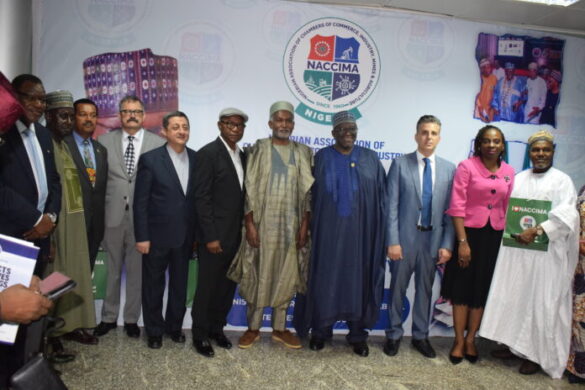
Chidimma Uchegbu- Abuja
The Nigerian Association of Chambers of Commerce, Industry, Mines and Agriculture (NACCIMA) has called on the diplomatic community to support Nigeria’s private sector in its bid to drive economic transformation.
The National President of NACCIMA, Dr. Jani Ibrahim made the call in his keynote address at the NACCIMA’s inaugural Economic Diplomacy Dialogue held in Abuja on Tuesday.
The event brought together ambassadors, government ministers, and business leaders to explore collaborative strategies aimed at strengthening trade, investment, and industrial cooperation.
While speaking further, Ibrahim described the initiative as a “new dawn in strategic partnership” between Nigeria’s organised private sector and international partners.
“Today’s dialogue is designed to foster deeper engagement between the diplomatic community and Nigeria’s private sector to promote trade, investment, industrial cooperation, and inclusive economic growth.
“NACCIMA seeks to leverage this platform to align with the Federal Government’s 8-Point Agenda and the “Nigeria First” principle, thereby amplifying our collective efforts toward realizing a $1 trillion economy,” he said.
Ibrahim laid out a series of policy proposals, including the establishment of a Private Sector-Diplomatic Dialogue Framework, the creation of joint working groups on trade and the digital economy, and impact monitoring systems to track measurable progress.
He also announced that NACCIMA would host an Investment Summit on December 2–3, 2025, to explore capital flows into key growth sectors.
In his remarks, the Minister of Foreign Affairs Yusuf Tuggar underscored the Federal Government’s diplomatic strategy in support of private-sector growth.
Tuggar stressed the significance of the event and reaffirmed NACCIMA’s central role in the Tinubu administration’s international economic policy.
“NACCIMA is a very important programme of government, and it is important to what the Tinubu administration is trying to achieve in terms of promoting trade and investments and strengthening supply and value chains in Nigeria,” Tuggar said.
He highlighted the government’s “strategic opportunity” approach—one that avoids ideological alignments and focuses instead on building pragmatic economic partnerships.
“Nigeria has always been open when it comes to dealing with other countries.
“We are mindful of the size of our population. Our goal is to leverage that advantage to create as much employment as possible,” the minister noted.
Tuggar pointed to the development of Special Economic Zones and regional development authorities as key tools in the administration’s plan to attract investment and expand production.
“We want to produce enough to feed ourselves and export to other countries,” he said, while clarifying that energy transition efforts would not exclude Nigeria’s vast hydrocarbon resources.
He also spoke about industrial revival, noting ongoing investments in refining capacity and clean energy sectors, including those related to climate-related manufacturing.
“These are areas where Nigeria must participate actively,” Tuggar said.
Importantly, Tuggaremphasised the need to go beyond diplomatic formality and support real, business-driven collaboration between countries.
“It’s not enough to just sign IPPA. “NACCIMA and their counterparts need to engage directly. That engagement, supported by the diplomatic community, will help us deliver results.”
He concluded by urging embassies and international business communities to invest in Nigeria’s transition economy.
The event also featured remarks from the Dean of the Diplomatic Corps, Ambassador SalaheddineIbrahima, who described Nigeria as “a country of unfathomable opportunities,” and praised Tinubu’s reform agenda.
Ibrahima, represented by the Ambassador of Lebanon to Nigeria HoussamDiab said, “These partnerships are pivotal to enhancing trade, investment, and sustainable development in Nigeria.”
Diab noted Lebanon’s move to establish a bilateral business council with Nigeria.
The Minister of Industry, Trade and Investment, Dr. Jumoke Oduwole, highlighted NACCIMA’s role in shaping Nigeria’s trade policy, including its leadership in the recently concluded five-year review of the African Continental Free Trade Area implementation.
Oduwole represented by her Special Adviser Patience Okala, said, “Nigeria was the first country to undertake this kind of assessment,” Okala said.
She also announced the launch of a new air cargo route linking Nigeria to 13 countries in Eastern and Southern Africa and unveiled plans for Nigeria’s first national export trading company in collaboration with Afreximbank.

Join the Conversation